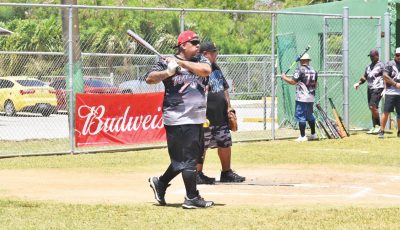Govendo: Post-election challenges will open door to non-stop battles
Allowing post-election challenges to voter eligibility would open the door to non-stop battles and would only frustrate the election process, according to Superior Court Associate Judge Kenneth L. Govendo.
The Legislature has already provided guidelines on how to challenge voter eligibility, said Govendo, and “these challenges are allowed up to election day and not afterwards.”
Govendo made the ruling in a written order yesterday granting motions to dismiss the election contest filed by defeated Northern Islands mayoral candidate Vicente Cruz Santos Jr.
On Tuesday afternoon, Govendo orally dismissed Santos’ lawsuit for lack of jurisdiction after hearing Northern Islands mayor-elect Francisco Jerome K. Aldan’s and the Commonwealth Election Commission’s separate motions to dismiss the case.
Aldan of the Republican won over independent Santos with a margin of 33 votes, 94-61, during the Nov. 4 general elections.
Santos, through counsel Janet H. King, sued Aldan and CEC, alleging that Aldan is not a resident of the Northern Islands and that there were 40 illegal votes.
In his 15-page written decision yesterday, Govendo ruled that CEC is a properly named defendant in this case.
Govendo said it is clear that CEC is a necessary party in election contest cases, particularly where—as in Santos’ case—its actions are being challenged.
On timeliness of the claim against Aldan, the judge noted that Santos filed his complaint on Nov. 19, 2014, claiming that Aldan does not meet the residency and domiciliary requirements necessary to serve as Northern Islands mayor.
Govendo said Santos did not provide any facts to establish when he became aware of Aldan’s alleged ineligibility.
The court did hear Santos’ testimony at a hearing on Tuesday, where he said he first became aware that Aldan intended to run for NI mayor some time in 2011. He also became aware that Aldan filed for resident status in NI in 2011.
Santos also disclosed that he saw Aldan in Pagan on May 29, 2014, and that he knew for certain at that time that Aldan would run for mayor.
Santos admitted that he doubted Aldan’s qualifications at that time.
Govendo said Santos, however, never challenged Aldan’s candidacy—neither with CEC nor with the court.
Santos contends that the Commonwealth election law does not provide any guidelines for contesting candidates.
Govendo agrees that details for these types of challenges are noticeably absent. However, the judge said, the law does provide that these type of challenges may be made.
In the footnote of his order, Govendo urged the Legislature to amend the Commonwealth election law to provide clear guidance on the procedures for challenging candidates.
“This court believes that a candidacy challenge should rightfully be filed before the election to avoid the necessary expenditure of time and funds and the uncertainty that comes with post-election challenges,” he said.
Nevertheless, Govendo said, the Commonwealth election law is clear on the timing of election contests.
He said a voter contesting an election must file a written, verified complaint with the Superior Court and have it served “within seven days after the discovery of the fact supporting the contest, except that no complaint may be filed over 15 days after the declaration of the official results.”
Govendo said the Commonwealth election law’s time clock began on Nov. 7, 2014, the day when CEC certified the election results.
Govendo agrees with Santos that the statute does not require the statutory clock to start running once election results are announced, and that the time may begin to run on some day after election results are announced.
However, the judge said, in this instance Santos believed well in advance of the election that Aldan was an unqualified candidate.
Govendo said Santos did not learn new facts after the election that provided him with grounds for a different challenge.
“Thus, one the election results were certified, plaintiff was aware that he had lost the election to a candidate he believed to be ineligible,” he said.
Accordingly, the judge pointed out, Santos’ seven-day window in which to file a complaint began on Nov. 7, 2014.
Under the statute, Govendo said, Santos had seven days—or until Nov. 14, 2014—to file this complaint.
Yet, Govendo said, Santos did not file the complaint until Nov. 19, 2014, five days after the statutory period expired.
“Accordingly, the challenge made against defendant Aldan was untimely filed, and this court lacks jurisdiction to preside over this issue,” he said.
On the timeliness of voter challenges, Govendo said he must determine whether Santos has the right to challenge voter eligibility post-election, and must determine if the challenge was timely filed.
Govendo said Santos was aware of the relevant facts related to the denial of his voter eligibility challenge well in advance of Nov. 12, 2014.
Govendo said Santos made various factual allegations about these voters’ eligibility in the challenge he submitted to CEC and could easily have made those same allegations to the court had he filed an appeal of CEC’s decision in accordance with the procedure.
Govendo said Santos did not appeal.
The judge said plaintiff had all the facts necessary to make his claim more than seven days prior to filing the complaint.
Govendo said Santos had this information regarding the voters as early as Sept. 11, 2014, when he made his initial voter eligibility challenge.
“Thus, similar to his challenge against defendant Aldan, the time within which to file this challenge with the court began on Nov. 7, 2014, when CEC certified the election results,” he said.
However, Govendo said, because Santos failed to exhaust his administrative remedies, any vote challenge filed after Nov. 4, 2014, would have been untimely.
Govendo said justice requires the court to deny Santos to file an amended complaint.
“Election contests are under strict time limitations in order to prevent uncertainty in the election process,” he added.



























